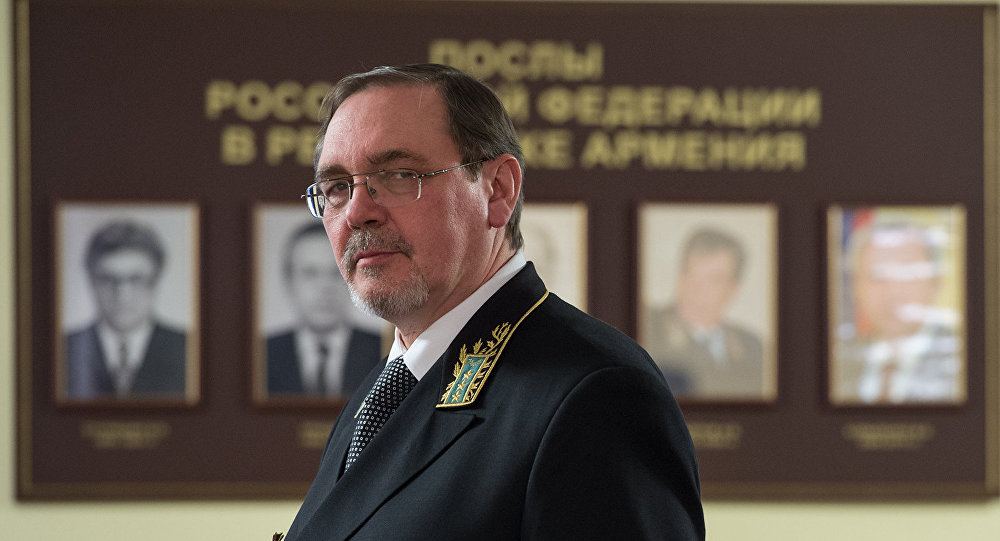The Russian Foreign Ministry’s new ‘curator’ for the South Caucasus
The Russian Ministry of Foreign Affairs is preparing to replace its main official responsible for issues related to the South Caucasus, Kommersant writes, as the current 70-year-old Deputy Minister Grigory Karasin must retire due to age limits on the post.
60-year-old Ivan Volynkin is likely to replace him – he currently heads the consular department of the foreign ministry.
The Karasin-Abashidze talks
The appointment prompts questions about the fate of the Karasin-Abashidze talks, which have been the only format of direct dialogue between Russia and Georgia since the August 2008 war, after which diplomatic relations between the two countries were cut off.
• The fate of Georgian-Russian transit trade through Abkhazia and South Ossetia
• How Russian propaganda sways Georgia’s ethnic minorities
The format of direct dialogue between Georgia and Russia was created in 2012, immediately after the Georgian Dream party came to power. Then-Georgian Prime Minister Bidzina Ivanishvili declared that normalisation of relations with Russia would be his priority and established the post of special representative of the prime minister for settling relations with the Russian Federation.
Career diplomat Zurab Abashidze was appointed to the post. He had experience as the Georgian ambassador to Russia. A new format of relations was created – in the form of regular meetings between Zurab Abashidze and the Deputy Minister of Foreign Affairs of Russia Grigory Karasin – their task was to restore economic, cultural and humanitarian relations.
Direct dialogue between the two countries was terminated after the August 2008 war, since the former Georgian government considered Russia an aggressor state, with whom dialogue was impossible without the presence of international observers.
Based on the agreements reached in the Karasin-Abashidze format in 2013, Georgian products – fruits, vegetables, wine, mineral waters – made it back onto the Russian market, and regular flights between Georgia and Russia were restored.
Karasin is known to have made critical statements about Georgia’s pro-Western course during his time as Russia’s representative at the talks.
After one of the last meetings in Prague with his Georgian counterpart, Karasin warned Tbilisi that “unpleasant surprises” would follow the strengthening of NATO in the Caucasus. The Russian diplomat drew a parallel with Ukraine.
“It is clear that if military NATO activity develops in the South Caucasus, sooner or later this will lead to problems. We remember how the Ukrainian problems began. This is exactly the same formulation of the issue”, the Russian diplomat said.
Who is Volynkin?
Ivan Volynkin’s name has caused a strong reaction in two countries of the South Caucasus at once – in Georgia and Azerbaijan.
Volynkin is a graduate of the Moscow Institute of International Relations (1981) – the most prestigious Soviet and Russian educational institution.
As a diplomat, he worked in the foreign offices of the USSR and the Russian Federation in Yugoslavia, the USA, Serbia and Montenegro, Georgia and Macedonia.

From 2009 to 2013, he was Assistant to the Head of the Ministry of Foreign Affairs of the Russian Federation Sergey Lavrov, Deputy Director of the General Secretariat of the Ministry.
From 2013 to 2018, he served as the ambassador of Russia to Armenia.
It is highly likely that Volynkin has maintained formal and informal ties with the Soviet KGB and its Russian successors with such a biography.
Volynkin is a persona non grata in Georgia.
In 2007, while working in Georgia, Volynkin and two more Russian diplomats were expelled from the country.
The then-president, Mikheil Saakashvili, accused the Russian diplomats of “involvement in intelligence activities in Georgia.”
The Georgian authorities suspected that the Russian diplomats were in close contact with Georgian opposition leaders, who, according to the authorities, coordinated their plans to forcibly overthrow the authorities with representatives of the Russian Embassy.
However, the current Georgian leadership, to put it mildly, does not always support the decisions taken by Saakashvili.
Abashidze says he will respond to the question of whether a new Russian representative at the talks will influence the format of the meetings after the Russian Foreign Ministry officially names the Karasin’s successor.
Abashidze says the format of talks is not a dialogue between two private individuals, but the Georgian-Russian dialogue, which deals with trade and economic relations.
Representatives of the Georgian Dream’s ruling Georgian Dream party have also refrained on commenting on Volynkin’s candidacy before his official appointment:
“Yitzhak Ravin and Yasser Arafat sat together at the negotiating table, however, they were not kindly disposed towards each other. Do we need negotiations? Any Russian diplomat can be declared persona non grata, because Russia is an occupying country. The idea of negotiations is not in personalities, but in the contact of the two countries,” said Gia Volsky, an MP from the ruling party of Georgia.
The Azerbaijani press has also published critical headlines against Volynkin.
Some Azerbaijani experts say that in appointing the former Russian ambassador to Armenia to be the ‘curator’ of conflicts in the post-Soviet space, Moscow is giving a signal about which direction it is heading in terms of the resolution of the Nagorno-Karabakh conflict.
“When Ivan Volynkin worked as the ambassador in Yerevan, he called Armenia the main and eternal ally of Russia in the region. Can Ivan Volynkin, who said that “Armenians and Russians are spiritually connected with each other,” give normal advice to President Vladimir Putin on the resolution of the Nagorno-Karabakh conflict?”, asks Elkhan Shahinoglu, head of the Atlas Center for Political Studies (CPI) in an interview with vesti.az.



















